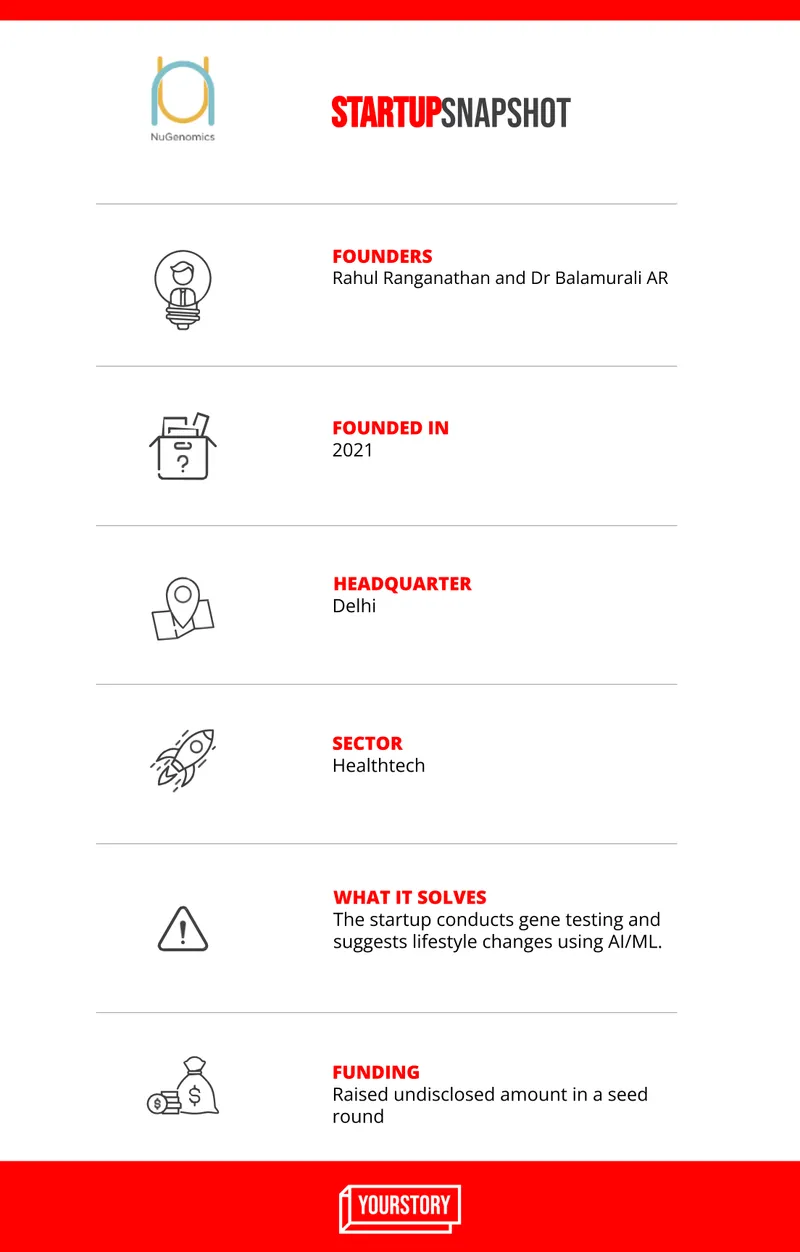Delhi startup NuGenomics uses AI/ML to recommend lifestyle changes based on genetic testing
Founded by Rahul Ranganathan and Dr Balamurali AR, NuGenomics combines multiple information points from a user to create a comprehensive picture of current and future health.
After completing his master’s in molecular biology, Rahul Ranganathan went on to do an MBA from XLRI Jamshedpur. He then spent the next seven years at various organisations like and to learn how a business works.
“Seven years in the corporate sector, I realised that I now know how business works. But science and genomics was my first love. I decided it was time to combine the two,” Rahul tells YourStory.
Rahul started Answer Genomics, a genetic research organisation, in November 2019. After two years of extensive research, patents, and on-ground testing, Answer Genomics launched its consumer-facing brand, NuGenomics, in July 2021.
“This is a dream that has almost been eight years in the making,” says Rahul.
Founded by Rahul and Dr Balamurali AR, NuGenomics is a machine learning and Human Genomics Organisation. The Delhi-based startup combines multiple information points from a user to create a comprehensive picture of current and future health.
The team
The two founders had connected over loss of family members to cancer.
Dr Balamurali was previously employed at Alcovia Technologies, Samsung, and Cognizant. He was a Postdoc Researcher at Laboratoire d’Informatique Fondamentale in France.
They decided to work to identify a better way to focus on data-driven health management and use genomics to predict, prognose, and allow for early diagnosis, recalls Rahul.
The startup has a team of 20 employees, including consultants and interns.
How it works?
uses patented technology to prognose, prevent, diagnose, and cure lifestyle disorders by providing health-oriented data, insights, and actionable suggestions made by its AI/ML system as opposed to a nutritionist.
The startup uses close to 5 million information points per individual to provide personalised and actionable suggestions in a micro-recommendation format to optimise both short-term and long-term health.
The startup’s product offerings include Genetic Test Report, which is priced at Rs 8,999 and it helps people understand their pre-dispositions towards cholesterol, HDL, LDL, Triglyceride, and Blood Sugar levels along with several other conditions to help their existing trainers and nutritionists.
Other offerings include DNA-based complete health check-up, DNA-based Weight Loss Programme in 111 days, DNA-based Weight Gain Programme in 111 days, and DNA-based Holistic Wellness Programme. The startup charges a one-time fee between Rs 10,000 and Rs 18,000.
Before the pandemic, when the startup was conducting on-ground tests, NuGenomics started conducting saliva-based genetic tests. However, over the course of the pandemic, the startup switched to blood tests.
The reports generated from these tests give the customers knowledge about their macro and micro nutrient requirements, food sensitivities, and intolerances, while the AI/ML-based system suggests lifestyle changes.
“When you give a particular set of information to a nutritionist and ask for recommendations, and then give the same set of information to the system, the system is more accurate. Because as humans, we are able to look at 5-7 different data points together while creating an ideal plan for the person. But the system looks at 5 million data points,” explains Rahul.

The market and business
According to a report by Market Data Forecast, the genetic testing market in Asia-Pacific region is expected to grow at a CAGR of 7.65 percent to $15.33 billion by 2027.
Geographically, the Indian genetic testing market is the fastest growing in the APAC region “owing to various diseases and developments in the healthcare sector,” the report said.
Asia Pacific is expected to register a significant growth rate due to increased disposable income, increased healthcare expenditure, increasing prevalence of chronic diseases, and rising government initiatives to spread the awareness regarding genetic testing, a report by Precedence Research said.
NuGenomics offers its services directly to consumers and also has a B2B model where it partners with organisations to conduct testing for employees.
The startup has tested a total of 500 customers until now. NuGenomics has also tied up with companies such as Myntra, Car-Dekho, Gameskraft, Purple Quarters, and Aveva to conduct gene testing for their c-suite employees.
The company raised an undisclosed amount of funding from India Accelerator and Lyxel&Flamingo, an independent digital media company, in June 2021.
Competition and USP
The startup sees competition from companies like Mapmygenome, The Gene Box, MedGenome Labs, Strand Life Sciences, Centogene, and Eurofins Product Testing, among others.
“For us, the most differentiating factor is that we went through extensive research to filter out markers from the global marker list that is available to see the kind of effect genetic markers have on the Indian population,” says Rahul.
“If you get this done from elsewhere, you will find standard markers which are being used in Europe and America. We went down to ensure that the markers that we are looking at are valid for the Indian population,” he explains.
The startup also uses AI, which can look at multiple data points and not just blood markers and thus give a more comprehensive report about why the AI has made a certain recommendation.
Plans ahead
In the next few months, the startup is looking to launch PCOS testing and a few other health products for women. NuGenomics is also working on developing products by focusing on immunity.
“We want to develop a range of products, reach out to different people, and discuss the problem they have and provide a solution,” says Rahul.
“At the end of the day, the idea is to have a personal health assistant in your hand, which has your genetics, your current blood levels, and your vitals, so that if there is a problem coming in your future, there is something that can give you real time recommendations and prevent that from happening.”
Edited by Megha Reddy









